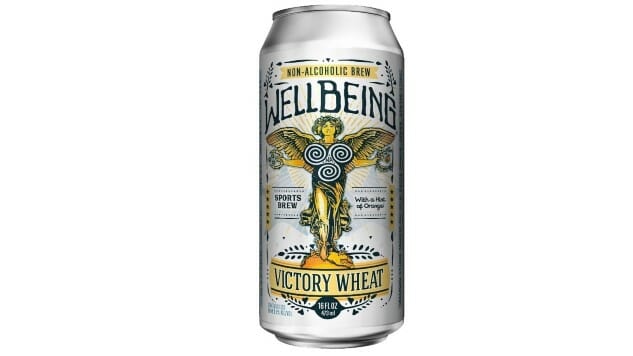On a certain level, you have to admire the chutzpah of a company that sends out a press release claiming it has created a new product “worthy of the title ‘World’s Healthiest Beer.’”
And on another, more accurate level, you have roll your eyes at the latest attempt to cash in on the “better-for-you,” alcohol-adjacent marketplace, particularly an attempt this guileless.
WellBeing Brewing Co. is a new face in this market, and claims to be “reinventing the non-alcoholic category with the release of WellBeing Victory Wheat, the first-ever non-alcoholic craft beer with all-natural electrolytes to keep consumers hydrated and vitalized.”
First things first: I’d love to see the data on consumer “vitalization.” I’m sure it’s riveting, and not at all anecdotal.
According to the company’s press release, WellBeing Victory Wheat hits store shelves on May 15, 2019. Brewed in the style of what is essentially an American pale wheat ale, Victory Wheat apparently contains some kind of orange flavoring (it’s really not clear from the release, which just says “brewed with a hint of orange” and nothing about hops), and is then “upgraded with Buoy, a formula of flavorless electrolytes developed to meet the hydration standards of the World Health Organization. With Buoy’s hydrating electrolytes, antioxidants, and B vitamins, WellBeing Victory Wheat is the ideal beverage for last calls, hot days and workout recovery.”
“WellBeing was started to create an entirely new category, non-alcoholic craft beer. We always knew we would make amazing, functional, and innovative styles,” said Jeff Stevens, founder of WellBeing Brewing Company, who the press release describes as “a proud non-alcoholic.” “WellBeing Victory Wheat not only tastes delicious, it provides health benefits no other beer can deliver.”
That quote of course ignores the fact that there is no shortage of non-alcoholic craft beer options out there these days, and in fact NA craft beers are available in a wide range of styles, from IPA to stout. Nevertheless, according to Stevens it’s “an entirely new category.”
The press release later goes on to describe Buoy as “essentially” flavorless, backtracking on the early statement that it is simply “flavorless,” and then takes aim at the two products it would most like to take market share from: AB InBev’s ridiculously successful Michelob Ultra, and Gatorade, the product that made most Americans aware of the word “electrolytes” in the first place.
“It’s a far tastier Michelob Ultra meets Gatorade, without the stuff athletes don’t want,” says Stevens. “Alcohol is so dehydrating and the added sugars and artificial junk in sports drinks just don’t make sense.”
In terms of pure calories, WellBeing Victory Wheat actually does come in well below the likes of Michelob Ultra, with only 85 calories in 16 oz can, compared with 95 calories in a 12 oz can of Ultra. Less mention is made of the product’s 16 grams of carbohydrates per can, vs. Ultra’s mere 2.6 grams. The full nutritional breakdown of Victory Wheat can be seen below, but we should note one thing: It can’t make the claim to be absolutely devoid of alcohol, such as Heineken’s much-publicized Heineken 0.0. Rather, cans of Victory Wheat are printed with “Contains less than 0.5% alcohol by volume,” a fact that is unsurprisingly not mentioned in the press release. Also appearing: The words “sports brew,” which I can’t imagine have any kind of legal definition. Perhaps that’s just us being cynical, though.
The company states that 4-packs of 16oz cans are now available at “Whole Foods markets in Missouri, Kansas, Tennessee and Colorado, and other select retailers beginning May 15, 2019.” Here’s your full nutrition info breakdown.
WellBeing Victory Wheat
Per 16oz serving
— Calories: 85
— Protein: 3g
— Carbohydrates: 16g
— Fat: 0
— Sodium: 87mg
— Potassium: 42mg
— Chloride: 183mg
— Magnesium: 3mg
— Vitamin B5: 9mg
— Vitamin B6: 12mg
— Vitamin B1: 6mg
— Calcium: 2mg
